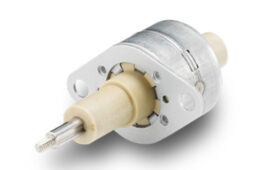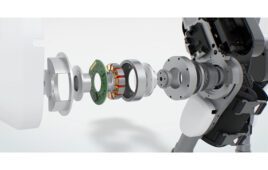NEWS RELEASE: Remote robotic assisted surgery system tested aboard the International Space Station
maxon’s components are integral in the spaceMIRA surgical robot, which recently completed its first demo test surgeries in zero gravity on the International Space Station. Six doctors took turns controlling the device from Earth.

The rigid arms with the motors mounted inside provide strength while fully enabling triangulation of the camera and instruments. [Photo courtesy of Virtual Incision]
spaceMIRA is a specially designed space-focused iteration of Virtual Incision’s MIRA, the world’s first miniaturized robotic-assisted surgery (miniRAS) system to be commercially available in the US. Similar to MIRA, its small and sleek design aims to offer the capabilities of robotic-assisted surgery (RAS) in a compact and convenient form factor that make it easier to transport and store the device. The modifications of spaceMIRA enabled pre-programmed and long-distance remote surgery capabilities for the experiment on the International Space Station (ISS).
Virtual Incision worked with maxon during the design of both the terrestrial version of MIRA and spaceMIRA. The robotic-assisted surgery (RAS) system incorporates the first-ever articulating camera. MIRA and spaceMIRA gain its strength in a small size by placing maxon’s motors inside the arms of the minibot. This structure allows the device to tackle a complex multi-quadrant procedure like colon resection across a broad range of patient types. The rigid, non-snake-like arms with internally mounted motors deliver the required strength to perform the surgeries while enabling triangulation of the camera and instruments.

maxon designs and manufactures a complete line of motors, gearboxes, and accessories for a wide variety of motion system applications, which enables a rapid iterative process in the design of MIRA that would meet demanding high speed and torque requirements. [Image courtesy of Maxon]
RAS systems offer multiple benefits to patients, including fewer site infections, less pain, less blood loss, smaller scars, shorter hospital stays, and quicker recoveries. The test procedure on the ISS supports the feasibility of long-distance surgeries. MIRA is easy to clean and sterilize between uses and does not need to be draped like larger main frame, boom-and-pedestal based units. Ultimately, MIRA is the smallest soft tissue robotic assisted surgery system on the market. It offers significant strength for its size and high output force and it is designed to enable quick setup in any operating room, whether in a large hospital, outpatient facility, or small rural surgical center.
The opinions expressed in this news release are the author’s only and do not necessarily reflect those of Medical Design & Outsourcing or its employees.


